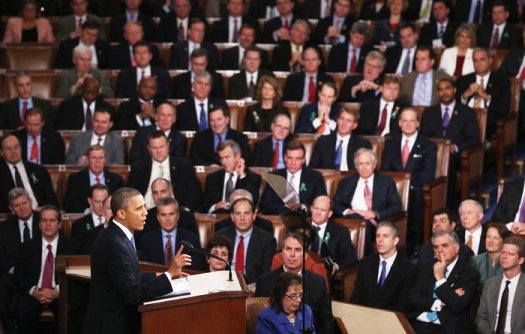The US Senate has said that it will impose new sanctions on Iran, the latest in a series of threats by Senate Republicans against Iran and a possible comprehensive deal between Tehran and P5+1.
This is the lead of a report Fararu, a news website, released on December 28 on GOP plans to slap still more restrictions on Iran. The following is the translation of the report:
Sen. Lindsey Graham (R-South Carolina), who is known for his anti-Iran stances, claimed in a joint press conference on December 27 with Zionist Prime Minister Benjamin Netanyahu in occupied territories that adopting legislation that tightens the sanctions against Iran will be one of the first measures of Congress when Republicans take over the Senate next month.
The US Congress will meet on January 20, more than two months after midterm elections in which Democrats lost the majority of seats to their rivals: Republicans.
The GOP’s control of Capitol Hill comes as Iran and P5+1 are taking the final steps toward reaching a comprehensive nuclear deal; a deal which can change the fate of Iran’s nuclear case for good, and turn it from a security and political issue into a normal case, like those of other signatories to the nuclear Non-Proliferation Treaty (NPT).
The comprehensive deal is also expected to focus on international sanctions by the UN Security Council on Iran as well as unilateral sanctions the US and the EU have slapped on the Islamic Republic.
The leading players, including hawkish US Senators, who oppose a nuclear agreement between Iran and P5+1 frown upon the normalization of Iran’s atomic case – something which is in keeping with an Iranophobia strategy – and persistently ask for keeping sanctions against the Islamic Republic in place.
Although the US Congress is not a serious obstacle in the way of dealing with Iran’s nuclear case as a normal [non-political] dossier, conclusion of a comprehensive agreement is tied to the settlement of all outstanding disputes, among them sanctions. That is where the US Congress can step in and resort to legal tools [to prevent the lifting of sanctions].
It remains to be seen whether Obama’s [veto] threat can stop the imposition of new sanctions against Iran in the new Congress which is to convene in less than a month.
Therefore, normalization of Iran’s nuclear case and settlement of sanctions issue, especially sanctions slapped by the US Congress, are interdependent.
As Iran’s Foreign Minister Mohammad Javad Zarif has said and US President Barack Obama has echoed it, imposition of fresh sanctions against Iran would kill the talks and amount to an official declaration of the end of diplomatic contacts to resolve the decade-long nuclear dispute.
That’s why Barack Obama, who is very optimistic about diplomatically solving Iran’s nuclear case before his second term ends, has repeatedly warned Congress that he will veto any sanctions act which will threaten a nuclear deal with Iran.
The threat was efficient, at least, in dealing with the outgoing Congress where Republicans were in the minority and Democrats defended the policies of the White House – although some fellow Democrats were opposed to any agreement with Iran. Thanks to the Democratic majority, plans to levy fresh sanctions against Iran were taken off the agenda.
It remains to be seen whether Obama’s [veto] threat can stop the imposition of new sanctions against Iran in the new Congress which is to convene in less than a month. In the meantime, US hardliners have jumped to action – even before the new Congress convenes – to pave the way for fresh sanctions against Iran.
Ali Vaez, a senior analyst for Iran at the International Crisis Group, has said that two measures have been taken in this regard in the past several weeks. First a hardline US institute [Institute for Science and International Security (ISIS)] referred to a recent report by the International Atomic Energy Agency on the injection of gas into IR-5 centrifuges, claiming this amounts to gross violation of the Geneva agreement. Under the Geneva Joint Plan of Action, Iran will continue its R&D activities, including those which do not involve stockpiling enriched uranium.
With that being the case, Iran and P5+1 should accelerate their efforts to arrive at least at a diplomatic deal before the new US Congress convenes in January.
In another attempt, the US media claimed that Iran’s efforts to procure equipment for Arak Reactor run counter to its obligations under the Joint Plan of Action. This comes as Iran has promised – under the Geneva Agreement – not to install new equipment in Arak Reactor, but it faces no limitation for buying such equipment.
In the buildup to the inauguration of the new US Congress, Republicans are full of determination to derail the processes which lead to a nuclear deal.
With that being the case, Iran and P5+1 should accelerate their efforts to arrive at least at a diplomatic deal before the new US Congress convenes in January. They have to agree on fundamental principles about the comprehensive deal; if so, hopes for reaching a final nuclear deal will be kept alive.
